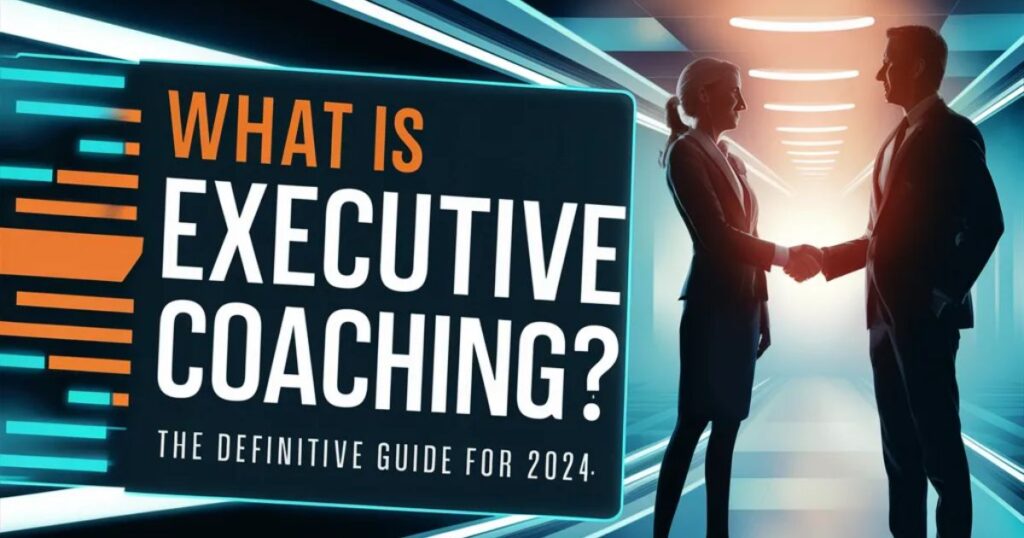In the ever-evolving landscape of the modern business world, the ability to adapt, innovate, and lead effectively has become paramount for organizations striving to stay ahead in the competitive business landscape.
That’s where the transformative power of executive coaching comes into play, offering a strategic professional development pathway for leaders, high-potential employees, and anyone seeking professional growth.
Executive coaching is a customized and collaborative process that empowers individuals to unlock their full potential, sharpen their leadership skills, and drive organizational success.
By partnering with an experienced executive coach, professionals embark on a tailored coaching journey designed to foster self-awareness, enhance emotional intelligence, and cultivate the mindset and strategies needed to navigate complex challenges with confidence.
As Andrew Richardson, an expert in the field, eloquently states, “Executive coaching is a customized and collaborative process that focuses on the specific needs, challenges, and aspirations of the individual executive.”
Table of Contents
Understanding Executive Coaching
At its core, executive coaching is a powerful professional development strategy that pairs individuals with a dedicated coach who acts as a trusted advisor, sounding board, and accountability partner.
Unlike traditional mentoring or training programs that offer generalized guidance, coaching is a highly personalized experience tailored to the unique goals, strengths, and areas for growth of each client.
The primary aim of executive coaching is to enhance leadership and management performance by developing the individual’s self-awareness, emotional intelligence, and capacity to influence others positively.
Through this collaborative partnership, the coach provides objective feedback, thought-provoking questions, and actionable strategies to help the client overcome blind spots, break through limitations, and unlock their full potential.
The Role of an Executive Coach

An effective executive coach wears many hats, serving as a catalyst for growth, a strategic thought partner, and a source of unwavering support throughout the client’s transformative journey. Their responsibilities encompass:
- Enhancing self-awareness: Helping the client gain deeper insights into their strengths, weaknesses, values, motivations, and blindspots through powerful questioning and assessments.
- Developing emotional intelligence: Coaching the client on managing emotions, building empathy, and improving social skills for more effective leadership.
- Improving leadership skills: Working with the client to sharpen abilities like decision-making, strategic thinking, communication, conflict resolution, and team management.
- Providing an objective perspective: Offering an outside view that challenges assumptions and sheds light on new possibilities for growth.
- Fostering accountability: Holding the client responsible for taking action, following through on commitments, and making consistent progress towards their goals.
Successful executive coaches possess a unique blend of skills and qualities, including deep industry expertise, excellent listening and communication abilities, and a genuine passion for helping others succeed.
They establish a safe, confidential space where clients can openly explore their challenges, vulnerabilities, and aspirations without fear of judgment.
Read this Article: PEDROVAZPAULO BUSINESS CONSULTANT
Benefits of Working with an Executive Coach
Investing in executive coaching can yield numerous benefits for both the individual and the organization they work for:
For the Individual
- Enhanced self-awareness and emotional intelligence: Gain a deeper understanding of your strengths, weaknesses, and motivations, and develop the ability to manage emotions and build meaningful connections.
- Improved leadership and management capabilities: Sharpen your decision-making, strategic thinking, communication, and team management skills to lead with confidence and authenticity.
- Greater confidence and focus: Develop a growth mindset, build self-assurance, and stay motivated and focused on your goals.
- Better work-life balance and stress management: Learn strategies to prioritize self-care, manage stress effectively, and achieve a healthier equilibrium between your professional and personal life.
For the Organization
- Higher employee engagement and productivity: Empowered, self-aware leaders inspire and motivate their teams, fostering a more engaged and productive workforce.
- Stronger leadership pipeline and succession planning: Develop a robust pool of high-potential leaders equipped to take on greater responsibilities and drive the company’s future success.
- Improved team performance and dynamics: Enhance communication, collaboration, and conflict resolution skills for more cohesive and effective teams.
- Better retention of top talent: Investing in employee development demonstrates a commitment to their growth, increasing job satisfaction and loyalty.
- A culture of continuous growth and development: Normalize the pursuit of excellence by prioritizing ongoing learning and self-improvement at all levels.
Research consistently backs up these benefits. One study found that executive coaching can boost individual productivity by up to 70% and team performance by a staggering 50% (stats from Elizabeth Perry’s article). Another calculated an impressive 788% return on investment for companies that embrace coaching.
Case Study: How Executive Coaching Transformed a Tech Startup
Consider the case of Jane, a co-founder of a promising tech startup. Despite her team’s innovative product and early traction, Jane struggled with effective communication and delegating responsibilities, often micromanaging her employees.
After engaging an executive coach, Jane gained valuable insights into her leadership style and its impact on her team. Through coaching sessions, she learned to trust her team members, communicate her vision more clearly, and empower them to take ownership of their roles.
The transformation was remarkable. Within six months, employee engagement and productivity soared, with team members feeling more motivated and aligned with the company’s goals.
Jane’s newfound self-awareness and emotional intelligence also improved her decision-making abilities, allowing the startup to navigate pivotal growth milestones with confidence.
This real-world example illustrates how executive coaching can catalyze positive change, not just for the individual but for the entire organization.
Who Can Benefit from Executive Coaching?

While the term “executive coaching” implies it’s solely for CEOs and top-level executives, the reality is that anyone striving for professional growth and greater leadership impact can benefit from this powerful development approach.
Executive coaching can be a game-changer for:
- High-potential employees being groomed for leadership roles
- Mid-level managers struggling with people management
- Senior executives navigating new roles or organizational changes
- Entrepreneurs and business owners looking to take their ventures to the next level
- Anyone feeling stalled or unfulfilled in their career development
The key is having an open mindset, a willingness to engage in self-reflection, and a sincere commitment to growing as a leader. As Elizabeth Perry wisely states, “If you’re ambitious but unsure where to direct your energy, you need a professional who can help you find your focus.”
Common Goals and Areas Coaches Help With
Executive coaches work with clients across a wide range of focus areas, tailoring their approach to the individual’s unique needs and aspirations. Some common goals and areas of development include:
- Cultivating emotional intelligence and self-awareness
- Developing strategic thinking and decision-making abilities
- Enhancing communication skills and leadership presence
- Building confidence and executive presence
- Improving time management and prioritization skills
- Navigating career transitions or new leadership roles
- Fostering team cohesion and collaboration
- Achieving work-life balance and stress management
- Developing a growth mindset and continuous learning habits
By working closely with their coach, clients can identify their specific areas for growth and develop a personalized action plan to address them effectively.
Recommended Post: PEDROVAZPAULO EXECUTIVE COACHING
How to Find the Right Executive Coach
With the rising popularity of executive coaching, there is no shortage of coaches offering their services. However, not all coaches are created equal, and finding the right fit is crucial for a successful and impactful coaching experience.
Here are some tips for finding the right executive coach for your needs:
- Look for relevant experience: Ideally, your coach should have corporate leadership experience in your industry or a similar field. This helps them better relate to the challenges you face and provide more contextual insights.
- Check credentials: While not mandatory, look for coaches with recognized coaching certifications from reputable organizations like the International Coaching Federation (ICF). This ensures they have undergone proper training and adhere to ethical standards.
- Assess coaching style: Different coaches have different styles – some are more direct, others more nurturing. Identify what resonates best with your personality and learning preferences.
- Evaluate expertise: Review the coach’s background, case studies, and testimonials from past clients to gauge their expertise in developing leaders like yourself.
- Ensure a personality fit: Coaching involves vulnerability and trust. Take the time to interview prospective coaches to see if you can build rapport with them and feel comfortable opening up.
- Clarify logistics: Discuss practical details like session frequency, duration, location (in-person or virtual), and fees to ensure the arrangement aligns with your needs and availability.
The Coaching Process Explained
Once you’ve found the right executive coach, it’s essential to understand what the coaching process entails. While each coach may have their unique approach, the general flow typically consists of the following phases:
Initial Assessment
The coaching journey begins with a comprehensive assessment to establish a baseline understanding of your goals, challenges, personality traits, and leadership style. This may involve psychometric assessments, interviews, and soliciting feedback from colleagues or direct reports.
Goal Setting
Based on the initial assessment, you and your coach will collaborate to set specific, measurable, achievable, relevant, and time-bound (SMART) goals for the coaching engagement. These goals will serve as the roadmap for your development journey.
Action Planning
With your goals defined, you’ll work with your coach to develop a detailed action plan outlining the steps you’ll take to achieve them. This plan may include specific strategies, exercises, reading materials, or other resources to support your growth.
Coaching Sessions
The core of the coaching process consists of regular one-on-one sessions with your coach. These sessions provide a confidential space for you to explore your thoughts, challenges, and experiences, receive candid feedback, and gain new perspectives.
During these sessions, your coach will employ various techniques, such as powerful questioning, active listening, and role-playing, to help you gain self-awareness, develop new skills, and reinforce positive behaviors.
Action and Reflection
Between coaching sessions, you’ll be expected to implement the strategies and actions discussed with your coach. This may involve practicing new communication techniques, delegating tasks, or making conscious efforts to change specific behaviors.
Your coach will hold you accountable for your commitments and encourage you to reflect on your progress, challenges, and learnings.
Progress Review
Periodically, you and your coach will review your progress towards your goals. This may involve reassessing your strengths and areas for improvement, celebrating wins, and making necessary adjustments to your action plan.
Closure and Next Steps
As the coaching engagement nears its end, you’ll work with your coach to review your overall growth, acknowledge your achievements, and develop a plan for sustaining your progress after the formal coaching relationship concludes.
This may include identifying ongoing development opportunities, establishing accountability measures, or exploring ways to apply your newfound skills and insights in your day-to-day leadership role.
The coaching process is iterative and dynamic, with the coach adapting their approach based on your unique needs, learning style, and progress.
Throughout the journey, open communication, trust, and a shared commitment to your growth are essential for maximizing the impact of the coaching experience.
Getting Started with Executive Coaching

If you’re ready to embark on your executive coaching journey, here are some practical steps to get started:
Define Your Goals
Reflect on your current challenges, aspirations, and areas where you’d like to grow as a leader. Clearly defining your goals will help you find the right coach and maximize the value of the coaching experience.
Research Potential Coaches:
Leverage your network, professional associations, or online directories to identify executive coaches that align with your needs and industry. Review their credentials, experience, and coaching approach to narrow down your options.
Schedule Consultations
Once you’ve identified potential candidates, schedule consultations or introductory calls to assess your fit and compatibility with each coach. Use this time to ask questions, discuss expectations, and gauge your level of rapport.
Evaluate and Select:
After meeting with potential coaches, evaluate your options based on their expertise, coaching style, availability, and overall fit. Trust your instincts and select the coach you feel most comfortable working with.
Establish Logistics
Once you’ve chosen your coach, discuss and agree on logistics such as session frequency, duration, location (in-person or virtual), and fees. Ensure the arrangement aligns with your schedule and budget.
Commit to the Process
Executive coaching requires an investment of time, effort, and vulnerability. Approach the process with an open mind, a willingness to learn, and a commitment to implementing the strategies and actions discussed with your coach.
Embrace Accountability
Your coach is there to support and guide you, but ultimately, your growth and success depend on your actions and dedication to the process. Embrace accountability and be prepared to step out of your comfort zone to achieve meaningful change.
While the executive coaching journey can be challenging, it is also incredibly rewarding. By investing in yourself and partnering with the right coach, you can unlock your full potential, develop the leadership skills necessary to navigate complex challenges, and create a lasting impact on your organization and career.
Conclusion
In today’s rapidly evolving business landscape, executive coaching has emerged as a powerful catalyst for leadership development and organizational succeses. By working with an experienced coach, individuals can embark on a transformative journey of self-discovery, skill development, and personal growth.
Executive coaching offers a customized and collaborative approach tailored to the specific needs, challenges, and aspirations of each client. Through this partnership, individuals gain self-awareness, enhance their emotional intelligence, and hone critical leadership skills such as decision-making, communication, and team management.
The benefits of executive coaching extend beyond the individual, positively impacting entire organizations through higher employee engagement, stronger leadership pipelines, improved team dynamics, and a culture of continuous growth and development.
As Andrew Richardson aptly states, “Executive coaching is a strategic investment that empowers leaders to tap into their full potential, drive organizational success, and thrive in today’s competitive business landscape.”
If you’re ambitious, driven, and committed to reaching new heights in your leadership journey, executive coaching could be the catalyst you need to unlock your full potential and create a lasting impact. Invest in yourself, find the right coach, and embark on a transformative journey that will shape your future as a leader.
Remember, as Elizabeth Perry wisely reminds us, “Working with a coach who can help fuel your career transformation isn’t just an investment in your future. It’s a commitment to grow, develop, and strive to be your best self. And you deserve that.”
